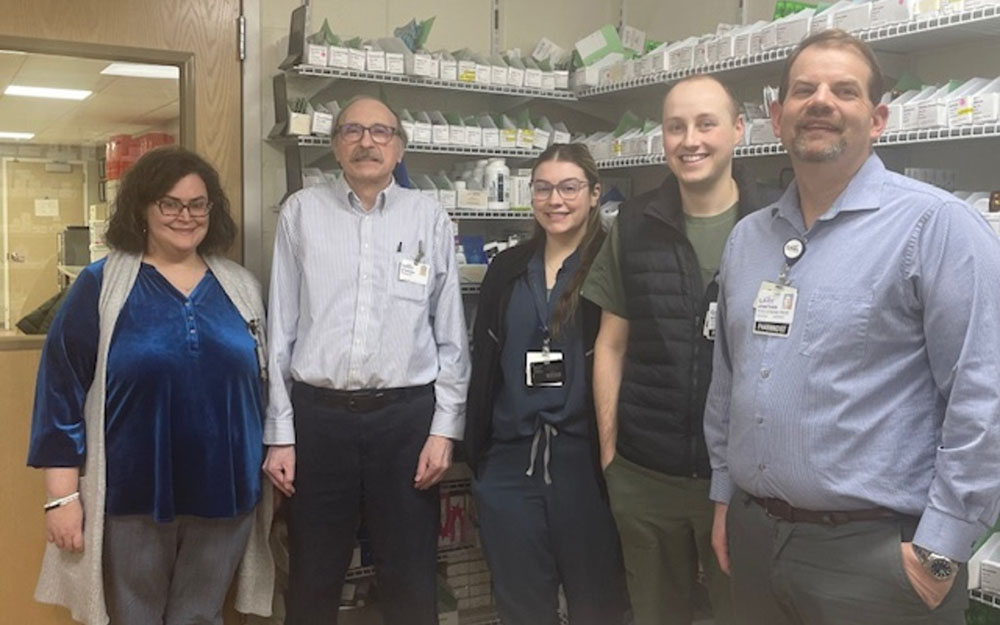
CARIBOU, Maine — On January 12 Cary Medical Center marked National Pharmacist Day. Pharmacists at Cary Medical Center work every day to deliver high quality patient care. Working together with the hospital’s medical staff, nursing and other clinical areas has been key to the ongoing success of the pharmacy service. Jonathan Anderson, RPH, Pharm D, director of the Pharmacy at Cary said that the environment at the hospital promotes collaboration.
“We are all here to deliver the best care possible for our patients,” said Anderson, who also manages the hospital’s purchasing department. “We work on a daily basis with our medical staff, and multiple clinical departments to assess the patient’s medication regimen and we do an assessment of the patient’s status, offer recommendations and our providers value our input.”
Anderson said that the education of pharmacists has gone through changes in recent years. Starting with two years of undergraduate study for basic courses the pharmacy student then applies for pharmacy school and takes an entrance exam similar to SATs. Once accepted the student will do an additional four years of training. In the sixth year the student is required to do multiple 6-week clinical rotations in retail pharmacy, hospitals, community settings and some students will complete rotations in sub-specialty clinical areas. Following graduation the candidate will sit for the national NAPLEX Exam. Successfully passing the exam results in licensure and a doctorate in pharmacy.
“The addition of the clinical rotations really changed the preparation for students to help them decide what career path they wanted to go down,” said Anderson. “This really helps the new pharmacist to make the right choice for them.”
The role of the hospital pharmacist has also changed over the years. Anderson pointed out that at Cary Medical Center a major focus is placed on individuals over 65 years of age.
“We review the patient’s current medication list when they are admitted to the hospital,” said Anderson. “We want to make sure the medication list they present is correct and we review the list of medications for any potential changes or recommendations we might have and we present any of these recommendations to the patient’s physician.”
Another key focus area is the hospital’s Intensive Care Unit or ICU. Hospital pharmacists do a daily chart review on every patient in the ICU. Based on the patient’s status, lab results and other factors the pharmacist may offer recommendations to the physician.
“We really work as a team to provide the most appropriate, safe, and beneficial medication program that we can,” Anderson said. “We work closely with our medical staff and they appreciate our work. Our nursing staff also plays a critical role in helping to manage the patient’s progress.”
Pharmacists at Cary are also very involved in the hospital’s cancer service. Every day a pharmacist is assigned to the Jefferson Cary Cancer Center. According to Anderson the growth of the Cancer Service has had a major impact on the pharmacy.
“Once again, working together with the patient’s physician a medication regimen is developed for each individual patient once that plan is put in place we move on from there making necessary adjustments as the patient continues their cancer journey. Now with ever improving and costly medications it is critical that the hospital pharmacist is part of the patient’s care team.”
Recent medication shortages that have been reported nationally also impact the hospital pharmacy. Anderson said that the pharmacists make every effort to stay on top of any potential shortages and proactively seek out alternatives that might be available.
A number of years ago Cary established a system called Computerized Physician Order Entry or
CPOE. The system provides a closed loop medication dispensing program where physicians order all medications through the computer. The order goes directly to the pharmacy for review and to check for any contraindications. Nurses are then alerted to the medication order and using a bed-side barcoding system with the patient’s wristband the nurse verifies that it is the right medication, for the right patient.
Anderson also said that he strongly supports pharmacists having a more active role in advising and educating patients about their medications.
“We are always available to patients here at the hospital,” he said. “We understand that patients may have questions about their medications and we work closely with nursing to address any issues and we are happy to visit with patients on the nursing units to address their concerns.”
The Cary Medical Center Pharmacy is composed of five pharmacists as well as four full time and one part-time pharmacy technician. Anderson encourages students to learn more about a career in pharmacy and welcomes students to complete job shadows at the hospital. To arrange for a job shadow experience contact the Office of Community Relations at Cary 207-498-1112.







